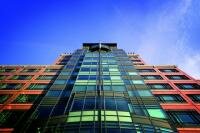
EBRD revises down growth forecasts for emerging Europe
19. October 2011. | 10:33  11:46
11:46
Source: Emg.rs, Tanjug
The EBRD is predicting a slow-down in emerging Europe’s economic growth next year with the continuing eurozone sovereign debt crisis posing challenges to recovery from the 2008-09 global financial crisis. The expectations of economic growth in the region have dropped the most for Serbia, Albania and Romania because those countries are exposed significantly to Greece's struggling economy.
The EBRD is predicting a slow-down in emerging Europe’s economic growth next year with the continuing eurozone sovereign debt crisis posing challenges to recovery from the 2008-09 global financial crisis.
The EBRD’s latest Regional Economic Prospects report underlines that economic fundamentals in the EBRD region are stronger in several respects than before the onset of the crisis.
But it notes that increased stress in the eurozone could have an even more severe impact on emerging Europe this time around. The latest forecasts assume a protracted but ultimately contained eurozone debt crisis.
The report revises down predictions for 2011 economic expansion in the EBRD region to 4.5 per cent compared with 4.8 per cent seen in July. Growth in 2012 is now seen at 3.2 per cent, compared with the 4.4 per cent expected three months ago.
The downward revision in 2012 economic forecasts reflects the prospect of much slower growth in central and south-eastern European countries, which are particularly vulnerable to eurozone stress. Growth in Russia and other CIS countries is less affected by events in the eurozone and growth there is expected to still be quite strong.
This latest economic report from the EBRD revises 2012 growth forecasts in the central Europe and the Baltic states region to 1.7 per cent, down from the 3.4 per cent seen in July, with the region’s strong links to the eurozone translating into much weaker growth.
The 2012 growth forecast has been downgraded in this region most substantially for Hungary and the Slovak Republic, the two transition countries that are the most exposed to the eurozone.
Southern and eastern Europe is seen growing at 1.7 and 1.6 per cent in 2011 and 2012, respectively, with the 2012 growth rate more than 2 points below the July forecast.
The outlook has worsened the most in this area for Albania, Romania and Serbia, which are heavily exposed to the troubled Greek economy.
Turkey’s growth is expected to slow down significantly to 2.5 per cent as a result of declining capital inflows and credit growth, as well as weakening external demand.
Recovery further east will be much less affected by the eurozone turmoil, as commodity prices are expected to remain elevated due to demand from still-growing emerging markets.
Growth in Russia will remain reasonably strong particularly in the run-up to elections in 2012 and output there is expected to grow by 4 per cent in 2011 and by 4.2 per cent in 2012.
This development will support expansion even in the non-commodity exporting countries of the CIS, which depend on Russia for exports and remittances. As a result, expansion in the eastern Europe and Caucasus (EEC) region and Central Asia will only slow down by about 0.7 percentage points in 2012 compared with the July projections, the report suggests.
EBRD lowers prognosis of Serbia's economic growth
The European Bank for Reconstruction and Development (EBRD) stated Tuesday that Serbia's economy has stabilized but that it's growth is still poor and will be at 2.1 percent for 2011 and 2012.
EBRD's expectations in July were that Serbia's economy would grow by 3.3 percent in 2011 and 4.1 in 2012.
Pre-election spending could boost a short-term economic growth, but some great risks still remain, mostly caused by Serbia's exposure to the Euro area, according to EBRD's latest report on regional economic expectations.
Serbia's inflation is still higher than the rest of the region, the document states, adding that the International Monetary Fund's continued support provides significant protection for the country.
The expectations of economic growth in the region have dropped the most for Serbia, Albania and Romania because those countries are exposed significantly to Greece's struggling economy.


 PRINT
PRINT
Comments (0)
Enter text: